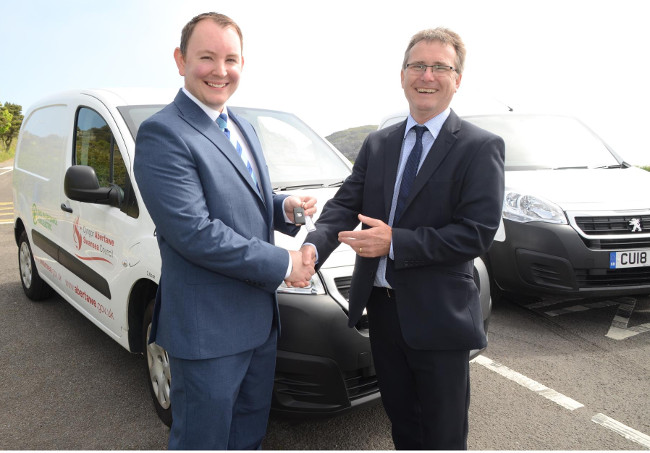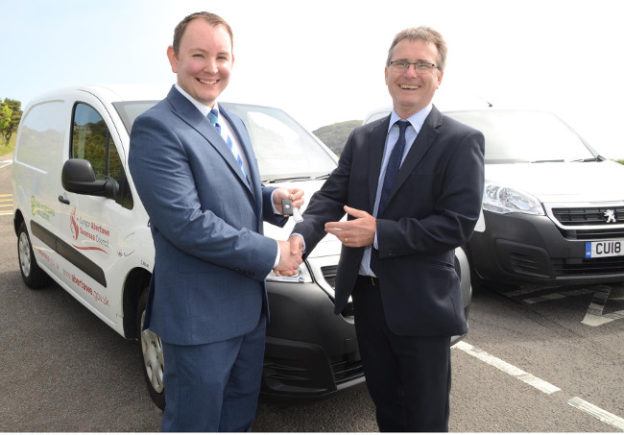
Swansea Council Fleet Manager Mark Barrow taking delivery of 40 Peugeot Partner electric vans from Day’s Fleet’s Neil Vaughan.
Car purchasing decisions are personal and not always entirely rational.
But businesses buying vans can’t afford to be swayed by emotional considerations or the latest fashion. Reliability, cost and fitness for purpose are the top requirements. And an increasing number of organisations are finding that these boxes are ticked by electric vans.
Swansea Council recently added no fewer than 40 Peugeot Partner Electric vans to its fleet. This is one of the largest local authority orders for electric vans so far and suggests a high level of confidence in this type of vehicle.
Swansea Council Fleet Manager Mark Barrow says that the organisation had already gained experience of electric vehicles by running 10 pool cars:
“An analysis of journeys and mileages clearly demonstrated their potential viability, whilst the preferred five-year lease equated to a budget neutral position that enabled us to achieve a much greener fleet.”
It’s now well understood by commercial operators that the diesel particulate filters in modern diesel engines are not well-suited to use on short, local journeys. Clogged DPFs are expensive and inconvenient.
To prevent any risk of flat batteries, Swansea Council has been able to install charging points at various municipal facilities around the city. But this isn’t always necessary as the range available from electric vans is enough to cover a full day’s operation for many business.
Town centre businesses with urban delivery routes are unlikely to do more than 50-80 miles in a day, a range that can be comfortably covered by most electric vans without needing a charge.
Another application where electric vans are well suited is for use on large industrial or transport sites, where mileages are very low and stop-start use is typical.
Looking further ahead, manufacturers such as Ford are developing plugin hybrid electric vans offering electric operation plus longer-range use via a conventional engine. These could help reduce urban emissions while still being practical for longer-range operation.
Tax incentives are fine, but charging is essential
The government’s Road to Zero report suggests that politicians want to encourage the uptake of electric and hybrid vans and will continue to offer incentives to buyers.
Pure electric vans already enjoy a £0 VED rate and often benefit from the plug-in van grant. But charging infrastructure is still limited. Improving this — so drivers can be confident of getting a battery boost wherever they stop — could trigger a big lift in electric van sales.
Rental demand could explode
I believe the future is very bright for electric vans. As organisations gain confidence in the cost and performance of these vehicles, order sizes are likely to multiply. And as companies become accustomed to electric power, they’ll expect to be able to source replacement and surge capacity electric vehicles from their rental suppliers.
Despite this, electric vans aren’t yet widely available in the van hire market. In my view, now could be a good time for van rental firms to start taking more interest in this growing market.


Pingback: Europcar aims high with l | vanrental.co.uk blog